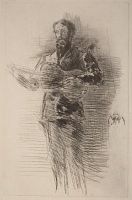The Guitar Player (M.W. Ridley) | ||
| Number: | 124 | |
| Date: | 1874/1875 | |
| Medium: | drypoint | |
| Size: | 279 x 179 mm | |
| Signed: | butterfly at right | |
| Inscribed: | no | |
| Set/Publication: | no | |
| No. of States: | 7 | |
| Known impressions: | 11 | |
| Catalogues: | K.140; M.138; W.122 | |
| Impressions taken from this plate (11) | ||
TECHNIQUE
Drypoint, augmented by heavy inking.
PRINTING
A reference to the drypoint as 'Guitar player (Delatre)' might suggest that Auguste Delâtre (1822-1907) printed an impression, or perhaps several of these impressions rather than that it is a portrait of Delâtre. 11
Although it originally dates from a few years earlier, Whistler printed several impressions in 1877 and for a while used a code of numbers, dots or dashes to keep track of impressions. For instance:
Although it originally dates from a few years earlier, Whistler printed several impressions in 1877 and for a while used a code of numbers, dots or dashes to keep track of impressions. For instance:
11: 22 October [1877], GUW #12737.
Guitar Player 2 ' ' x . . . 12
Guitar Player No. 3 ' ' 13
Guitar Player No. 3 ' ' 13
12: To Marcus Bourne Huish (1843-1904), 10 October 1877, GUW #12734.
13: To C. A. Howell, 12 October-5 November [1877], GUW #12735.
The code may be interpreted in different ways, but the most likely is that Whistler was noting the second impression sold, leaving three in stock, followed by the third, leaving two in stock. Alternatively he could meant the second of five printed, followed by the third of the same print run of five. 'X' could possibly mean one intended for exhibition, or be a mark of quality.
Eleven impressions have been located. The first state was printed in black ink on cream 'antique' (pre-1800) laid paper with the watermark or countermark 'IV' ( ) and on an irregular sheet of ivory 'antique' laid paper (
) and on an irregular sheet of ivory 'antique' laid paper ( ). These were followed by impressions in black ink on various types and shades of laid paper including off-white with the Arms of Amsterdam watermark (
). These were followed by impressions in black ink on various types and shades of laid paper including off-white with the Arms of Amsterdam watermark ( ,
,  ); ivory (
); ivory ( ); ivory with beehive 'DEDB' watermark (
); ivory with beehive 'DEDB' watermark ( ); off-white (
); off-white ( ) and again ivory (
) and again ivory ( ,
,  ). The fifth state is on buff laid paper (
). The fifth state is on buff laid paper ( ) and the final state on cream paper with the watermark of the Arms of Strasbourg over 'V' (
) and the final state on cream paper with the watermark of the Arms of Strasbourg over 'V' ( ). Several impressions were printed with heavy surface tone to augment the shadows and enhance the effect of the drypoint burr (
). Several impressions were printed with heavy surface tone to augment the shadows and enhance the effect of the drypoint burr ( ,
,  ,
,  ).
).
 ) and on an irregular sheet of ivory 'antique' laid paper (
) and on an irregular sheet of ivory 'antique' laid paper ( ). These were followed by impressions in black ink on various types and shades of laid paper including off-white with the Arms of Amsterdam watermark (
). These were followed by impressions in black ink on various types and shades of laid paper including off-white with the Arms of Amsterdam watermark ( ,
,  ); ivory (
); ivory ( ); ivory with beehive 'DEDB' watermark (
); ivory with beehive 'DEDB' watermark ( ); off-white (
); off-white ( ) and again ivory (
) and again ivory ( ,
,  ). The fifth state is on buff laid paper (
). The fifth state is on buff laid paper ( ) and the final state on cream paper with the watermark of the Arms of Strasbourg over 'V' (
) and the final state on cream paper with the watermark of the Arms of Strasbourg over 'V' ( ). Several impressions were printed with heavy surface tone to augment the shadows and enhance the effect of the drypoint burr (
). Several impressions were printed with heavy surface tone to augment the shadows and enhance the effect of the drypoint burr ( ,
,  ,
,  ).
).
